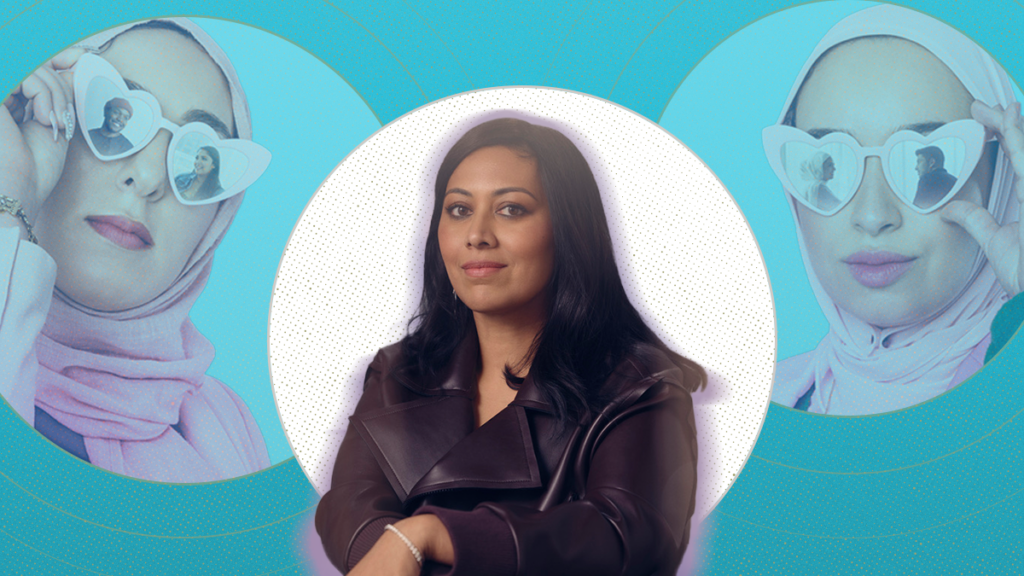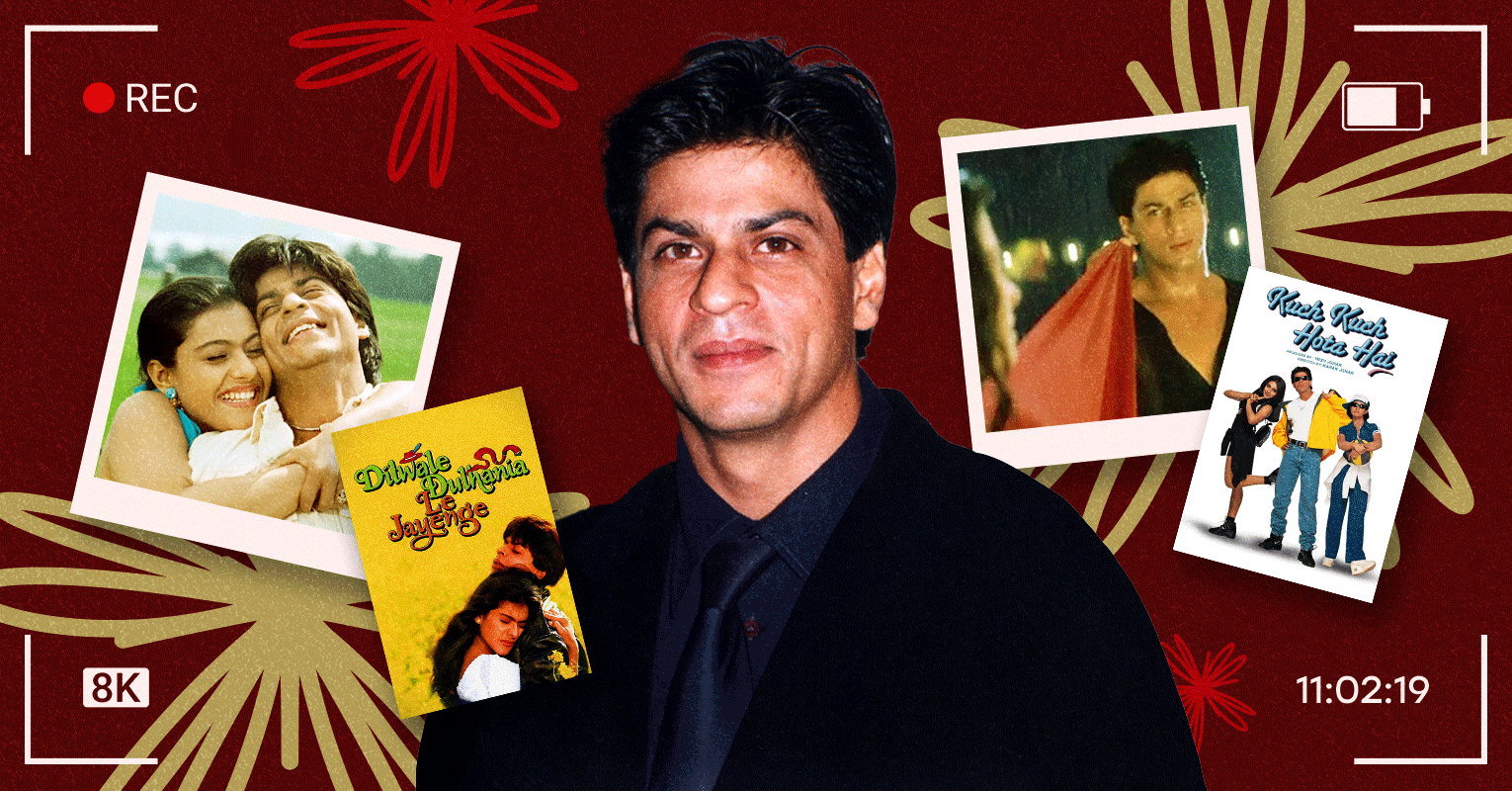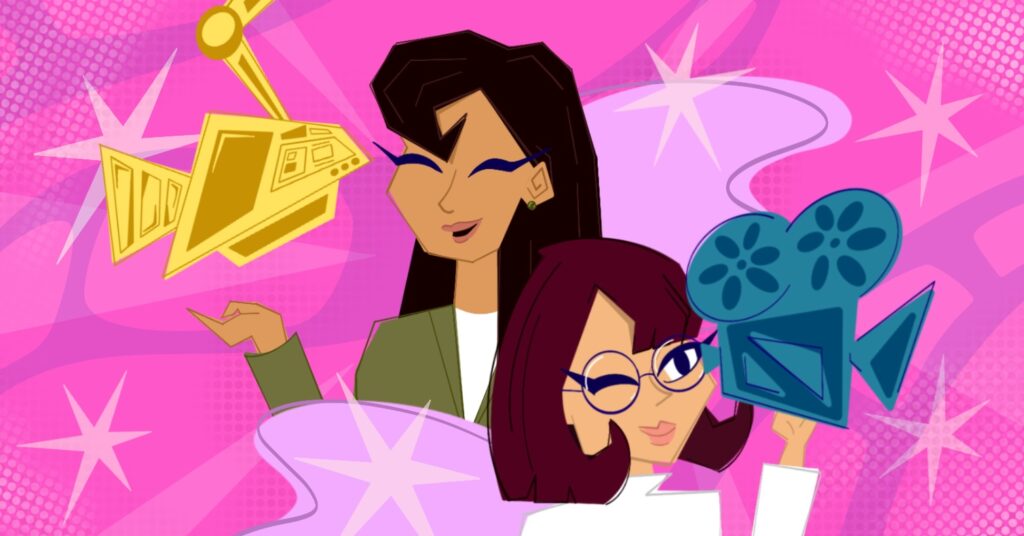Smriti Mundhra on “Muslim Matchmaker” and Her Perspicacious Approach to Storytelling

Since 2017, Indian American filmmaker Smriti Mundhra has been making waves in the unscripted sector of the entertainment industry. From the development of her first feature-length documentary film, A Suitable Girl, to the creation of her first Netflix original reality series, Indian Matchmaking, Mundhra has stayed true to her vision, telling stories in vérité. Her earnest method hasn’t gone unnoticed as Mundhra has received critical acclaim, including two Academy Awards nominations for St. Louis Superman (2020) and, most recently, I Am Ready, Warden (2024).
“I’m not only of Indian descent, but I’m American, and I’m a woman, and I’m a millennial. There are many dimensions to my personality, my upbringing, and my professional trajectory that I think would make me equipped to tell many different types of stories,” Smriti Mundhra stated as she anticipated the future. “I look forward to spreading my wings into lots of other types of storytelling.”
Fresh from a week of Oscar’s celebration, Mundhra connected with EnVi via Zoom to discuss her newest reality series, her career growth, and her nuanced storytelling approach.
Setting the Scene
In her early years, Mundhra spent her time between Los Angeles and Mumbai — experiencing the richness of both Hollywood and Bollywood, the respective hearts of cinema. With influence from her environment and those dearest to her, Mundhra set out to achieve her dreams, leading with an idealistic mindset. That is until the harsh reality began to seep in. Mundhra’s initial career trajectory was to become a creative producer, but she explained that her creative mindset wasn’t being fully nurtured in her early career. The experience seemed to be more on par with that of a production line worker — very humdrum. “I became a bit disillusioned with [the] process. I was working in independent film…in an environment where, you know, my talent and labor were being utilized, but I wasn’t allowed to contribute creatively in the way that I really wanted to, so I had this calling to find my own voice as a filmmaker in whatever capacity.”
Breaking free from the mold, Mundhra returned to school, seeking an MFA degree, where she was able to reignite her creative spark and truly understand what she wanted to achieve, career-wise. “[F]or a long time, I didn’t see directing in my future. But I think, when I look back on it now I think a lot of that was what I had internalized, in terms of what I could do in this industry,” she vulnerably expressed. “I always felt like producing was my path. Because as a woman of color especially, I felt maybe my role in being able to do the thing that I loved, which was to make movies, was to be of service to others. I never really thought that I could be the leader.”
The path to achieving her now fully realized dream was not an easy feat as Mundhra hit a roadblock that most aspiring filmmakers do — acquiring funding. “[W]hen I tried to raise money for my first feature film…it became clear that there was no room in the fiction space,” she stated. “It was going to be difficult for me to get somebody to finance my vision or my stories, so I pivoted to documentary because honestly, the barrier to entry is lower. [Y]ou need less money to start…[and] I didn’t want to wait for my moment, so I started making [my first documentary film, A Suitable Girl].”

Despite various set-backs, Mundhra expressed gratitude for everything she endured — it made her more resilient and confident above all. “I’m so lucky, actually, in hindsight. I feel like all of those early challenges and disappointments were all for a purpose, because I found my calling both as a director and [in] making documentaries,” she stated resolutely. “I just fell in love and I felt like I had found my place, after so much searching and what I was meant to do. So it all worked out for the best.”
As Mundhra continually carved her path in the entertainment industry her vision became more refined. For a majority of her works Mundhra highlights the intersection between love and religion, specifically highlighting different variations of arranged marriage — both traditional and contemporary. Explaining the draw to the subject matter, Mundhra noted how the concept played a part in her personal life: “I was raised with a lot of pressure and expectation around the idea of marriage,” she revealed. “My parents, especially my mother, were very involved in and opinionated around who I would marry and how I would marry and all of that. It was something that I struggled with, for a lot of my life personally, just those expectations, that pressure, the conflict it caused between me and my family and how I resolved that or tried to resolve that.”
In an attempt to better understand not only herself but her culture, Mundhra channeled her introspection into tangible exploration. “[Overall] I think it is a big part of my work because it’s a big theme of my life. At least it was for most of my 20s and some of my 30s. And I think it’s a window into really understanding where we are as a society and a culture. Our values around partnership and companionship and the role of women in society. It is a lens through which we can unpack a lot of these things.”
Muslim Matchmaker: Procuring Love with Perseverance
Mundhra’s first examination into the practice of arranged marriage came with her 2017 documentary, A Suitable Girl, which was filmed in Mumbai and New Delhi. The vérité-style documentary follows three women over four years as they undergo the process of arranged marriage — each carefully treading the line between individuality and conformity.
Just a few years later, Mundhra’s vision expanded to the world stage with the Netflix original dating reality series Indian Matchmaking. The relationship with the series’ matchmaker, Sima Taparia, began by chance years prior, with Munhra simply being a prospective client of Taparia’s: “[At the time], my mom…was really getting concerned about my lack of marital prospects. So she asked me to meet a matchmaker on a trip, to visit my family in Bombay, and that’s how I met Sima Taparia, who now the world knows as Sima from Mumbai. And that’s how even professionally that journey started.” Although the concept for Indian Matchmaking was initially rejected by intransigent television executives, the show would go on to be renewed for three seasons and counting.
In 2025, it was announced that Mundhra’s newest dating reality series, Muslim Matchmaker, would be premiering on Hulu, following three years of development. Heading the series are two new matchmakers, Hoda Abrahim and Yasmin Elhady, who specialize in matching hopeful singles within the Muslim community. Over eight episodes, audiences observe a variety of participants as they navigate through not only finding love — but also finding themselves.
Everything about the Muslim Matchmaker series is laced with contemporary elements, from the practices Hoda and Yasmin utilize to how Mundhra first came into contact with the pair: “Quite literally, I slid into their DMs,” she revealed with a laugh. “After the success of Indian Matchmaking, I was eager to explore this subject through more lenses and different lenses. And I was looking around and trying to get to know other matchmakers from different communities,” Mundhra explained. “I think people started telling me about Hoda and Yasmin and then I found them on Instagram. I was really captivated by them from what I saw just on social media and I DM’d them and said, ‘Look, I’m a producer and I made this show about matchmaking. I think it’s a really fascinating topic and I think the work that you’re doing in that space is interesting. Would you like to talk?’ And that’s how it all began.”
Captivating is truthfully the best way to describe the newest set of matchmakers, as the distinct synergy Hoda and Yasmin exude when working with their clients cannot be ignored. They are equal parts compassionate and unyielding. “I think [Hoda and Yasmin] are very different from the other matchmakers that I’ve worked with on different shows,” Mundhra said with delight. “[T]hey are in their 30s, so they’re of a similar age as most of their clients. [I also] think they relate to the aspects of dating culture today, whether it’s swipe culture on the apps or the breadcrumbing and commitment-phobia. All the kinds of things that people today deal with in the dating space.”
One of the many unique elements Hoda and Yasmin bring to the table is their rules of three, which encourages their clients to take accountability and practice stability while pursuing love. The rules of three entails that clientele commit to three dates, over the course of three months, and have weekly video chats where they ask 300 questions designed to further gauge their compatibility and help them better understand what they want in a partner. In the end, even if a match isn’t made, the client will still gain a new understanding of themselves — that is, if they are willing to fully commit to the process.
Muslim Matchmaker features a higher level of diversity than previous series that Mundhra has worked on, which creates space for observing more perspectives. “[O]ne of the most exciting things to me about Muslim Matchmaker is that you not only get to see so much geographic and ethnographic diversity within the Muslim community, but you also get to see the diversity in terms of levels of observance and styles of observance of faith…while always understanding that we’re all one ummah, right? [W]e’re all under one. All of our participants, no matter their racial or ethnic background or their geographic background or their level of observance, they’re all Muslims, and there’s no wrong way to practice the faith, as long as you practice it with your heart, you practice it with earnestness.”
Although Mundhra herself is not Muslim, through the development of the series she gained a new outlook on life, as well as a deeper appreciation for a religion she’d only ever observed from the outside looking in: “[H]aving the opportunity to do this deeper dive and really understand more about Islam, more about Muslim culture, faith and practice, I learned how much universal wisdom there is in Islam and how much beauty there is in the religion that I didn’t know [before],” she explained. “There are aspects of Muslim faith and culture that I apply to my life now, moving forward. And I hope people who watch the show [realize] that there is so much wisdom [from Islam] that we can apply [to our lives] no matter what background you are, what faith you are.”
I Am Ready, Warden: A Reflective Exploration on Justice
With her 2024 MTV short documentary, I Am Ready, Warden, Mundhra examined the nuanced topic of capital punishment. The documentary follows Texas death row inmate, John Henry Ramirez, a week before his execution. One of Ramirez’s final tasks involves seeking forgiveness from Aaron Castro, the son of the man he killed many years prior.
The exploration of Ramirez’s story came fortuitously as Mundhra initially planned to cover the topic of capital punishment through a different angle: “I [was] working on another project that was in the Texas death row system, which was a more traditional kind of true crime, wrongful conviction case, and that project ended up going away because there was a legal development in that case that curbed our access, but I was still connected to a lot of people in that community.”
It goes without saying: when one door closes, another door opens. Through those continued connections, Mundhra came across Keri Blakinger, an investigative writer for The Marshall Project, a publication that covers topics involving the United States criminal justice system. “Keri specifically wrote a lot about Texas prisons and the criminal justice system in Texas — and specifically a lot about Texas death row. But she wrote about the men on death row with just a deep sense of humanity and purpose. And that really spoke to me,” Mundhra revealed. “I reached out to her and asked if she wanted to collaborate on a documentary project and specifically explore something that wasn’t about an innocence case or a wrongful conviction case.”
With coverage of a subject matter that she was not familiar with, Mundhra was understandably wary of the narrative she would soon portray. “Before I started making this film, my understanding of capital punishment and the death penalty were purely intellectual,” she explained. “I had never been directly impacted by either the criminal justice system or violent crime. I’m a middle-class girl from Southern California, and I just had never been directly impacted by that personally. But what sort of drew me to wanting to explore this, in this way is that I had some really deep moral concerns — about this policy that was being essentially perpetuated in my name, as I’m the person that these policies, of law and order and capital punishment and criminal justice are purportedly designed to protect.”
Examining any topic with bias scarcely brings forth significant change. Instead, it primarily perpetuates a sort of regularity — which can be either detrimental or advantageous, given the conditions. Mundhra’s comprehension of this labyrinthine concept empowered her to deliver a documentary that would effectively provoke a new perspective and generate thoughtful conversation. “I wanted to examine [the subject], not from an aggressively, agenda-driven, anti-capital-punishment stance, but just to explore it, right? What does this mean? Why do we do this? What is it trying to solve? Who is it trying to help? And who is it harming?” she explained. “I’m grateful that the participants in this film, both John Henry Ramirez and Aaron Castro — and the other people who opened their hearts and their lives to us — allowed us to really examine [the subject] in a much more complex nuanced way.”
Scripted Works: In Pursuit of More
After focusing on the unscripted sector for several years, Mundhra was granted the opportunity to work on the Netflix original series Never Have I Ever. The coming-of-age series follows Indian American high school student Devi Vishwakumar (Maitreyi Ramakrishnan) as she navigates through grief, strict family dynamics, and teenage angst.
When detailing how she came to direct the third and fourth episodes of season three of Never Have I Ever, Mundhra explained that it was a veteran actress and screenwriter who gave her a chance. “[I]t’s interesting because I was given the opportunity to begin my career in episodic television directing by Mindy Kaling and Lang Fisher, who were the creator and showrunner respectively of Never Have I Ever,” she revealed. “I think they were fans of Indian Matchmaking, and when I expressed a desire to direct an episode of television, they gave me that chance and I had no experience doing that. But what I realized is all of my life experience, my career experience made me a great fit to direct episodic television because I had a background both as a producer and a documentary filmmaker.”
Mundhra added another scripted project to her resume after directing the fourth episode of Amazon Prime series The Pradeeps of Pittsburgh. From the mind of Vijal Patel, the comedy series centers around the Pradeeps, an Indian family who are at risk of deportation as they are alleged suspects in an arson case involving their neighbors, the Mills. Moving from doubtful to self-assured, Munhra expressed keenness towards the process of working in scripted entertainment. “[E]pisodic television directing is something I really love [and] I enjoy doing. I love working with actors. That was really new to me. And the actors on both shows are so generous — and the showrunners as well.”
Meralta Films: The Voice of Many
In 2021, Mundhra founded Meralta Films, a Los Angeles and Mumbai-based production company aimed at creating fiction and non-fiction content from the perspective of the global majority. Meralta Films is home to several perceptive productions, including commercials like Bumble’s “Equal Not Loose,” featuring Priyanka Chopra Jonas, and documentaries like Eyes on the Prize: Hallowed Ground.
The choice to reject the phrase “minority” and instead refer to themselves as the “global majority” is one of resilience. “I can’t even remember where I first heard that phrase, but it really resonated with me because I bristle at the idea of being referred to as a minority,” Mundhra stated. “[When we use the phrase ‘minority’] that’s contextualizing everything through, frankly, a white male lens, right? I’m only a minority if we consider white men, the majority, or the dominant demographic. But in reality, as a woman, I’m part of the majority. As an Indian, I’m part of a plurality of the population of this world. As a person of color, I’m a part of a majority in the population of this world.”
The usage of the uplifting phrase extends beyond herself as an individual It also weaves into her craft — translating into a new level of optimism. “Whether it’s women, people of color, or South Asians or what have you, I speak to a majority of this global population. And I try to remember that, when I feel like a small fish in a big pond, I try to remember, ‘Actually, I’m speaking to a much broader demographic than I think I am.’” In her personal journey, Mundhra hopes to further expand her already diverse resume: “I think for me personally, as a filmmaker, the next frontier for me is to do my first narrative, scripted feature film. I haven’t done that yet. So that’s something I really look forward to.”
With regards to the future of Meralta Films, Mundhra explained how her team aims to keep their vision alive despite opposing forces. “[As] a company, we are in a really difficult time in the industry right now. There’s so much uncertainty and fear that [are] driving decisions. And so for us, we’re trying to stay clear-eyed and clear-headed about our purpose,” she said confidently. “[O]ur purpose is to tell stories from the perspective of the global majority and to make those stories feel universal and feel commercial — and to ask the big, existential questions that are important to our times. However we do that, whether we do that through short documentaries, through dating shows, or through feature films — or any other way — that’s really what drives us every day.”
Keep up with Smriti Mundhra on Instagram and watch Muslim Matchmaker on Hulu!
Ready for more ACT!ON content? Check out our interview with Award-winning Korean animator and storyteller Hyun-jin Lee here!
















